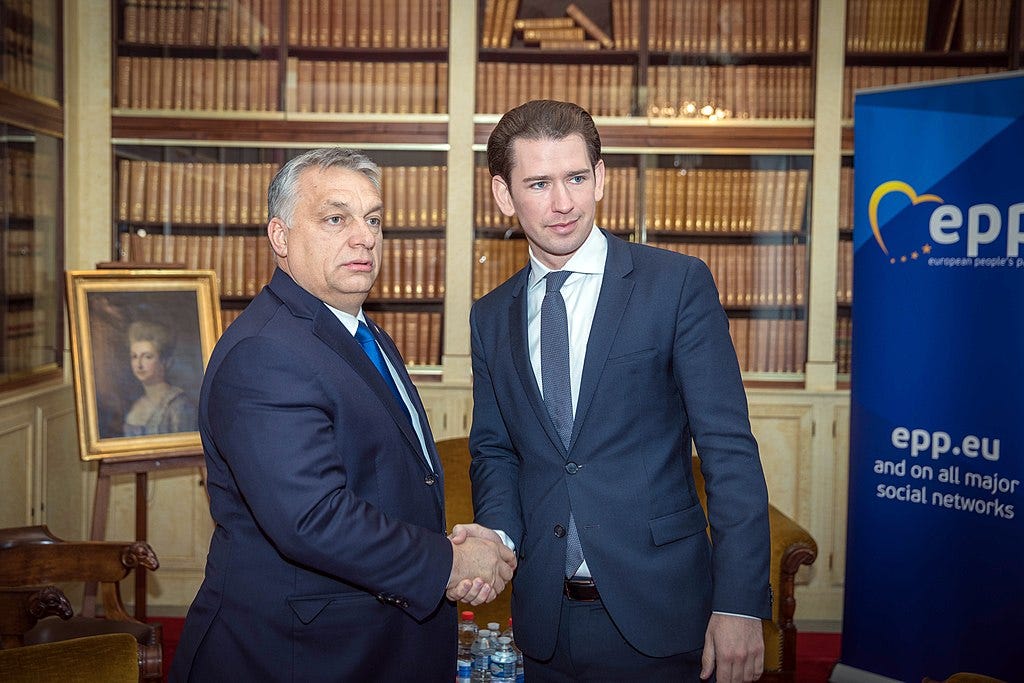Is Austria Being Orbánized?
The latest attack by the People's Party on state prosecutors has invited comparisons between Sebastian Kurz and Hungarian prime minister Viktor Orbán

Servus!
A leading politician from the governing party holds a press conference in which he attacks a state prosecutor currently investigating his party over corruption allegations. You would be forgiven for assuming this scene occurred in contemporary Hungary, Poland, or Slovenia, but the aforementioned in fact took place just yesterday in Austria. The politician was Andreas Hanger, the ranking ÖVP member on the investigative committee looking into allegations raised by the Ibiza affair, and the prosecutor was Matthias Purkart, accused by Hanger of “unbelievable political bias” as his anti-corruption agency explores the ÖVP’s political dealings.
By way of reminder: Austria’s anti-corruption authority, the WKStA, is currently undertaking a sweeping investigation into ties financial and political between the ÖVP and FPÖ, the international gambling giant Novomatic, and the partly state-owned casinos operator Casinos Austria. It is also looking into the nature of Thomas Schmid’s appointment as head of Austria Holding PLC, the body that controls Austria’s state-owned assets including Casinos Austria. Finance minister Gernot Blümel’s home was searched as part of the WKStA’s investigation, while chancellor Sebastian Kurz is currently being investigated over possible false statements made to the Ibiza committee. All parties remain innocent until proven otherwise.
Over the weekend, both the Standard and Profil ran comprehensive features documenting Hungary’s transformation from democracy to democracy-in-name-only (or a Führerdemokratie, as the political scientist András Körösényi has termed it). Since 2010, when Viktor Orbán came to power in a landslide victory, his regime has been able to rewrite the constitution, stack the judicial system, install a friendly president, enrich his friends and associates using state-owned assets and EU disbursements, and bring state-controlled and most of the privately-owned media in Hungary to heel. All this, while promulgating a populist and ultra-nationalist political ideology whose victims, as Freedom House states, include “opposition groups, journalists, universities, and [NGOs] whose perspectives [Orbán] finds unfavorable.”
Freedom House now considers Hungary a Partly Free state in the middle of the European Union, and Hungary’s proximity to Austria as well as the aforesaid domestic political crisis have invited much talk of Austria’s impending ‘Orbánization.’ The commentator Hans Rauscher has previously described the way in which Kurz operates as ‘Orbán light,’ and in this weekend’s Standard, he looked at the similarities and differences between the Hungarian prime minister and the Austrian chancellor who, Rauscher observes, have both led their ostensibly Christian democratic parties in populist directions and rely on a small clique of long-time friends and associates to govern their respective countries.
To the extent that it concentrates the mind concerning the state of Austrian democracy, the comparison is worthwhile and pertinent, though it has its limits, as Rauscher himself acknowledges. First, while Orbán stands at the helm of an ideological project to dismantle Hungarian democracy—"the new state that we are building is an illiberal state,” he said in a landmark 2014 address—Kurz does not, and his own political ideology or governing principle is sometimes hard to discern. Second, Orbán has evidently overstepped the bounds of what the prime minister of an EU member state should do vis-à-vis the constitution, judiciary, and free press, but Kurz—his populist tendencies notwithstanding—has not crossed that line.
Or, as his political opponents might caution: not yet. This latest “politically organized” attack on Austria’s justice system by Hanger has figures like Vienna mayor Michael Ludwig gravely concerned, and “one need not look too far, including within Europe,” Ludwig said Tuesday, to see where these sorts of attacks can lead.
Bis bald!
Thank you for signing up to the Vienna Briefing. If you know someone who would be interested in receiving this newsletter, consider sharing it with them today.
No-fer
Norbert Hofer resigned Tuesday as head of the far-right Freedom Party. Hofer cited the internal power struggle with parliamentary faction boss Herbert Kickl as one reason behind his decision to step aside. Hofer’s resignation sets the stage for a possible leadership contest between Kickl, Upper Austrian deputy governor Manfred Haimbuchner, and Vienna party boss Dominik Nepp.
Promises, Promises
Austria will miss its end-of-June deadline—set by chancellor Kurz at the beginning of April—for administering first doses of a coronavirus vaccine to all those who want one. The government also announced this week that its Green Pass in the form of a QR code will not be rolled out on June 4 as previously promised.
Hala Alaba!
Austrian defender David Alaba has joined the Spanish giants Real Madrid, ending months of speculation about his future following his failure to negotiate a new contract with Bayern Munich before it expired at the end of the Bundesliga season. The 29-year-old has signed a five-year deal with Real said to be worth 100 million Euros.



